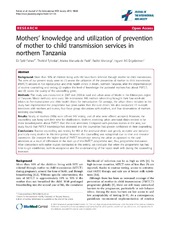| dc.contributor.author | Falnes, Eli Fjeld | en_US |
| dc.contributor.author | Tylleskär, Thorkild | en_US |
| dc.contributor.author | De Paoli, Marina M. | en_US |
| dc.contributor.author | Manongi, Rachel | en_US |
| dc.contributor.author | Engebretsen, Ingunn Marie S. | en_US |
| dc.date.accessioned | 2011-04-11T11:37:53Z | |
| dc.date.available | 2011-04-11T11:37:53Z | |
| dc.date.issued | 2010 | eng |
| dc.Published | Journal of the International AIDS Society 13: 36 | en_US |
| dc.identifier.issn | 1758-2652 | |
| dc.identifier.other | oai:frida.no:537419 | eng |
| dc.identifier.uri | https://hdl.handle.net/1956/4651 | |
| dc.description.abstract | Background: More than 90% of children living with HIV have been infected through mother to child transmission. The aims of our present study were to: (1) assess the utilization of the prevention of mother to child transmission (PMTCT) services in five reproductive and child health clinics in Moshi, northern Tanzania, after the implementation of routine counselling and testing; (2) explore the level of knowledge the postnatal mothers had about PMTCT; and (3) assess the quality of the counselling given. Methods: This study was conducted in 2007 and 2008 in rural and urban areas of Moshi in the Kilimanjaro region of Tanzania. Mixed methods were used. We interviewed 446 mothers when they brought their four-week-old infants to five reproductive and child health clinics for immunization. On average, the urban clinics included in the study had implemented the programme two years earlier than the rural clinics. We also conducted 13 in-depth interviews with mothers and nurses, four focus group discussions with mothers, and four observations of mothers receiving counselling. Results: Nearly all mothers (98%) were offered HIV testing, and all who were offered accepted. However, the counselling was hasty with little time for clarifications. Mothers attending urban antenatal clinics tended to be more knowledgeable about PMTCT than the rural attendees. Compared with previous studies in the area, our study found that PMTCT knowledge had increased and the counsellors had greater confidence in their counselling. Conclusions: Routine counselling and testing for HIV at the antenatal clinics was greatly accepted and included practically every mother in this time period. However, the counselling was suboptimal due to time and resource constraints. We interpret the higher level of PMTCT knowledge among the urban as opposed to the rural attendees as a result of differences in the start up of the PMTCT programme and, thus, programme maturation. After comparison with earlier studies conducted in this setting, we conclude that when the programme has had time to get established, both its acceptance and the understanding of the topics dealt with during the counselling increases. | en_US |
| dc.language.iso | eng | eng |
| dc.publisher | BioMed Central | eng |
| dc.relation.ispartof | <a href="http://hdl.handle.net/1956/5091" target="_blank">The mother, her confidants and the prevention of mother-to-child transmission of HIV (PMTCT) services in the Kilimanjaro region, Tanzania</a> | eng |
| dc.rights | Attribution CC BY | eng |
| dc.rights.uri | http://creativecommons.org/licenses/by/2.0/ | eng |
| dc.title | Mothers’ knowledge and utilization of prevention of mother to child transmission services in northern Tanzania | en_US |
| dc.type | Peer reviewed | |
| dc.type | Journal article | |
| dc.description.version | publishedVersion | en_US |
| dc.rights.holder | BioMed Central Ltd. | |
| dc.rights.holder | © 2010 Falnes et al; licensee BioMed Central Ltd. This is an Open Access article distributed under the terms of the Creative Commons Attribution License (http://creativecommons.org/licenses/by/2.0), which permits unrestricted use, distribution, and reproduction in any medium, provided the original work is properly cited. | |
| dc.identifier.doi | https://doi.org/10.1186/1758-2652-13-36 | |
| dc.subject.nsi | VDP::Medical disciplines: 700::Clinical medical disciplines: 750::Communicable diseases: 776 | eng |

